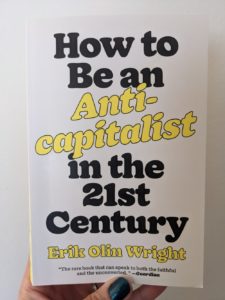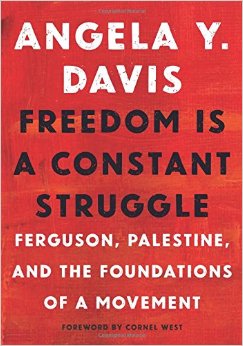Mutual Aid by Dean Spade
Written by Ashley Kelmore, Posted in Reviews
Best for:
Anyone who is interested in building community and addressing challenges while working outside the traditional methods.
In a nutshell:
Author Spade discusses the concept of mutual aid and how it differs from the concepts of non-profit and charity work, and offers tips for successful solidarity work.
Worth quoting:
(There is a lot, but the below paragraph I think helped me to shift what changing the world means to me.)
“Solidarity is what builds and connects large-scale movements. In the context of professionalized nonprofit organizations, groups are urged to be single-issue oriented, framing their message around ‘deserving’ people within the population they serve, and using tactics palatable to elites. Prison-oriented groups are supposed to fight only for ‘the innocent’ or ‘the nonviolent,’ for example, and to do their work by lobbying politicians about how some people — not all people — don’t belong in prison. This is the opposite of solidarity, because it means the most vulnerable people are left behind: those who were up-charged by cops and prosecutors, those who do not have the means to prove their innocence, those who do not match cultural tropes of innocence and deservingness. This narrow focus actually strengthens the system’s legitimacy by advocating that the targeting of those more stigmatized people is okay.”
Why I chose it:
I’ve had a very capitalistic view of community engagement and improvement in the past, and was looking for a book to help me better understand a different model for community support.
What it left me feeling:
Motivated
Review:
I live in the UK, and during the lock down phases of the pandemic (which were many in the UK) I joined a mutual aid WhatsApp group. It was pretty straightforward, and I don’t want to overstate my involvement as others actually organized the work – I just responded when I could. This usually meant printing and delivering grocery vouchers to individuals. The money came from (I believe) the local council in the beginning; eventually there were calls for funds from the community, and then the whole operation was shut down. There was something so lovely about it from the standpoint of there wasn’t, as far as I knew, any real gate keeping. Someone would say what they needed, and people would provide if they could.
Prior to this experience, my involvement in supporting and building community was usually limited to donating to charities and assuming that non-profits knew what was best to address social challenges overlooked by the government. Heck, I was even on a junior board for a health non-profit. I often applied for jobs at non-profits, and went to school for public and non-profit management and policy. But much of what I learned in grad school is challenged by this book.
The book talks a lot about collaboration vs majority rule, and challenges the hierarchical nature and set-up of so many non-profits and charities. I found those parts super interesting, as someone who has only worked in hierarchical spaces. The book doesn’t shy away from warning about the potential pitfalls of mutual aid work either – there’s a whole chapter in there on what to look out for.
My only real gripe with the book is that there isn’t much evidence provided to support Spade’s claims – there’s a great resource list in the back, but when the author makes claims that one would consider declarative, he doesn’t provide anything to back that up. Granted, most of the statements feel true, but it’s easier to dismiss statements when they are presented as fact without evidence. An example of this is this statement: ‘When groups are volunteer-based, people are more likely to admit their limitations and scrap bad ideas, because they are motivated by purpose, not elite approval.’ Like, I mean, probably? But that’s a statement that I’d like some support for if we’re going to then base other actions off of it.
That seems like a huge caveat, but in reality I don’t think it takes too much away from the message of the book and the very real tips Spade offers. So many books about world-changing are very theoretical; this one feels super practical to me, and I very much appreciate that.
This is a small book (only about 150 pages, and the size of a trade paperback). It took be a long time to read only because I just didn’t read a lot this month. Once I finally sat down and decided to finish it, it was a quick read.
Recommend to a Friend / Keep / Donate it / Toss it:
Recommend to a Friend and Keep



